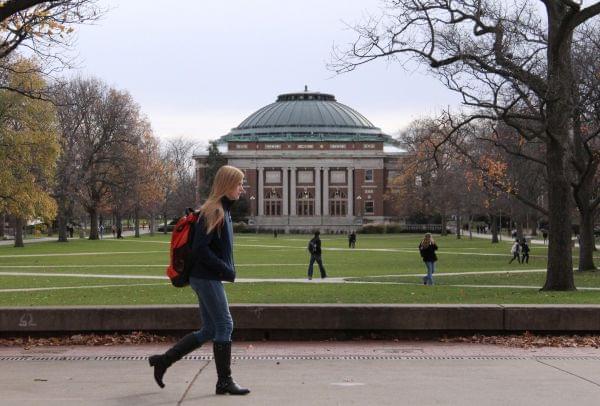Rauner Vetoes U Of I Student Trustee Bill

In this Nov. 20, 2015 file photo, University of Illinois students walk across the Main Quad on campus in Urbana, Ill. On Thursday, Jan. 21, 2016, university trustees approved a tuition freeze for instate freshmen. David Mercer/Associated Press
Illinois Governor Bruce Rauner has vetoed a bill backed by the University of Illinois that would have allowed a nonresident student to serve as a student trustee. Rauner's veto keeps in place rules outlined in the University of Illinois Trustees Act, which includes three criteria, including proof of a student's residency in Illinois.
Under the act, a student trustee must be a registered voter in Illinois, have proof of residency in Illinois for at least six months, and have a valid Illinois driver's license.
The legislation Rauner vetoed Friday would have allowed students who meet just one of those criteria to be trustees.
But Rauner said the legislation would have allowed nonresidents on the board, and because the school is a public institution, in-state student representation on the board "should be a priority.''
The governor also issued the following statement accompanying his veto of the bill.
"Student trustees have the authority to influence decisions with lasting effects on the University and Illinois taxpayers, so it is therefore important to ensure that student trustees are residents of Illinois. Senate Bill 2204 goes too far in eroding the residency requirement."
A student interested in running for the job was disqualified. He was an immigrant without legal status. That led Senator Iris Martinez, a Chicago Democrat, to pass legislation to prevent that from happening again, by easing the requirements to be considered an "Illinois resident."
Martinez says she'll work to override the veto, but that would require at least 10 lawmakers to reverse their original position on the proposal.
Links
- Board of Trustees meeting on the Chief Dialogue
- U Of I Trustees Freeze In-State Tuition For Second Straight Year
- GOP Leaders Choose Former U Of I Student Body Pres. Olsen For Vacant IL House Seat
- Robert J. Jones Named New Chancellor For U Of I Urbana Campus
- U of I Trustees Call On State Leaders To End Budget Impasse
- Governor Rauner Vetoes Pay Hikes For Construction, Home Healthcare Workers
- The Stopgap Budget; Summer Books - Guilty Pleasures; Does Facebook Know Where You Are?
- Rauner Signs Bill Reducing Pot Penalties
- More coverage from the News-Gazette

